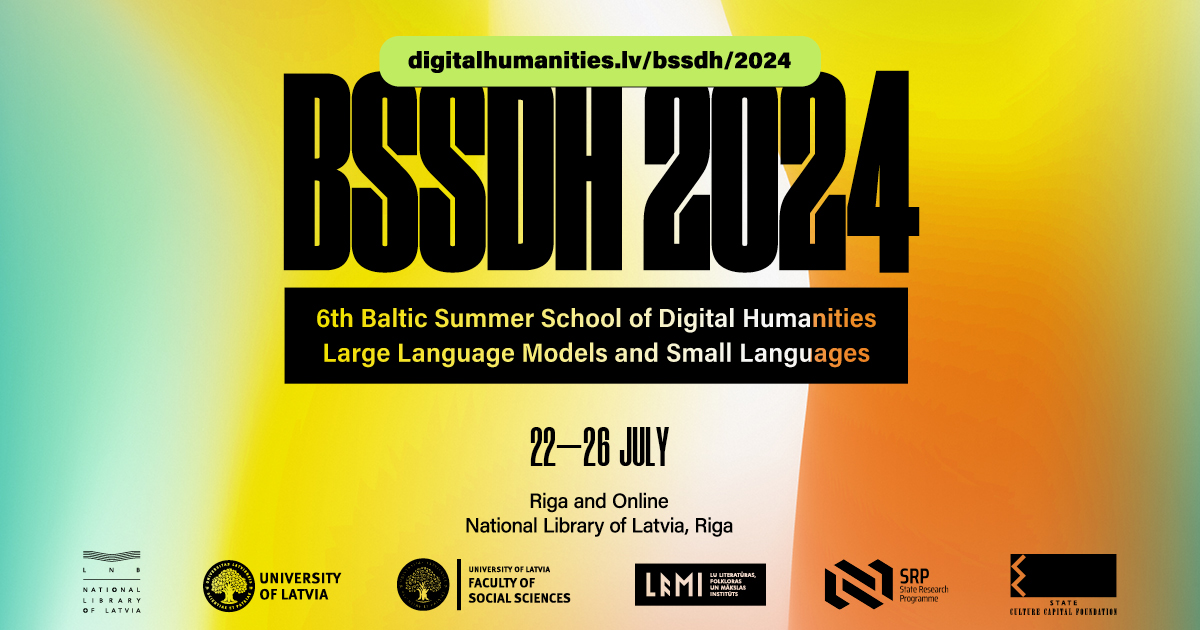
Students, researchers, and GLAM professionals are welcome to enroll in the Sixth Baltic Summer School of Digital Humanities: Large Language Models and Small Languages, which will be held on 22-26 July 2024 at the National Library of Latvia (NLL) in Riga and online.
Register here: https://www.digitalhumanities.lv/bssdh/2024/registration/
This year, participants will have the opportunity to learn text processing and data visualization using the Python programming language, led by researchers from the National Library of Latvia and faculty from the University of Latvia and Riga Technical University, Uldis Bojārs and Valdis Saulespurēns. The curriculum will spotlight the capabilities and research applications of large language models. Andres Karjus, a researcher specializing in computer linguistics and cultural analytics at the University of Tallinn’s CUDAN Open Lab, will showcase the efficiency and speed with which these sophisticated language models can conduct text annotation and analysis, surpassing the output of earlier technological generations. Līva Rotkale, a philosopher and docent at the University of Latvia, will share her insights on formulating effective inquiries for the ChatGPT language model, focused on the needs of humanities researchers and students.
We will also discuss how the development of natural language processing tools and large language models is progressing for smaller languages. Presentations will be made by Javier de la Rosa, a researcher from the Artificial Intelligence Laboratory of the National Library of Norway, who will talk about the development of a large language model for the Norwegian language, as well as by researchers of the Latgalian language Sanita Martena, Ilga Šuplinska, and Antra Kļaviņa, who will introduce the digital resources for the Latgalian language. A separate session will be dedicated to text morphological and syntactic annotation tools, which are particularly important when working with morphologically rich languages (session led by Normunds Grūzītis, a lead researcher at the Artificial Intelligence Laboratory at the Institute of Mathematics and Computer Science of the University of Latvia).
Focusing on the use of artificial intelligence in image processing, the special guest for BSSDH 2024 will be the researcher and artist Mar Canet Solà, who will demonstrate the Collection Space Navigator – a tool that provides the ability to examine multidimensional image data from various perspectives. This topic could be of particular interest to specialists from memory institutions who oversee the creation and research of digital image collections.
The school is organised as a hybrid event on-site and remotely. The fee for completing the full course is EUR 40 for both on-site and online participants; keynote lectures will be accessible for free and streamed on the NLL’s Facebook and YouTube channels.
The working language is English.
The Baltic Summer School of Digital Humanities is organised in cooperation with the National Library of Latvia, the Institute of Literature, Folklore and Art of the University of Latvia, and the University of Latvia.
Supporters:
Project “Towards Development of Open and FAIR Digital Humanities Ecosystem in Latvia” (No. VPP-IZM-DH-2022/1-0002), National Research Programme “Digital Humanities”
Common Language Resources and Technology Infrastructure CLARIN, CLARIN-LV
For more information contact:
Anda Baklāne
National Library of Latvia
Head of Digital Research Services
E-mail: dh@lnb.lv
http://www.digitalhumanities.lv/bssdh